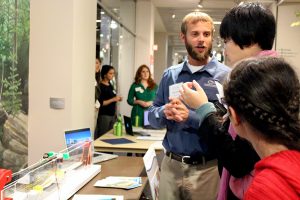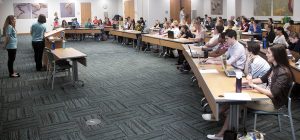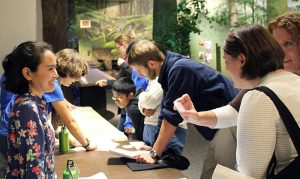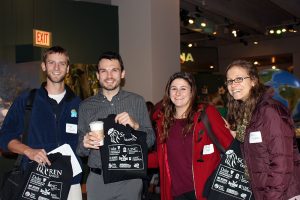Photos by Rhett Register
August 26, 2016

Scientists share lesson plans based on their research with local teachers at SciREN events.
Teachers know back to school means more than new notebooks and fresh calendars. With the new school year upon us, STEM — Science, Technology, Engineering and Math — educators in North Carolina’s Triangle are brainstorming novel ways to engage their students in these fields. If you can relate, grab that new planner because on the evening of Sept. 9, you have a date with SciREN Triangle!
Now in its third year, this free networking event brings science from the research bench to the classroom. The event will be held from 5:30 to 9 p.m. on Friday, Sept. 9, at the North Carolina Museum of Natural Sciences in Raleigh.
SciREN, which stands for Scientific Research and Education Network, has a simple goal: to provide classroom teachers with STEM lesson plans written by North Carolina scientists. At the annual networking event, researchers provide information about their lesson plans while local formal and informal educators circulate the facility, talking to the scientists and picking up materials.
SciREN organizers know that not just any lesson plan will do: There are standards to be met and specific topics to be covered. That’s why, before participating all scientists receive training in writing lesson plans that meet state and federal education standards. The resulting lesson plans can be fully integrated into the STEM curriculum.

Participating scientists receive training on how to write lesson plans that meet state and federal education standards.
Scientists base the lesson plans on their own research, so commonplace topics take on exciting new dimensions. Students may explore the effects of climate change on coral reefs through a lesson on ocean acidification, or learn about the importance of habitat diversity using tropical butterflies as a case study. As a result, teachers can expose their students to the dynamic and varied nature of contemporary science, possibly inspiring future scientists in the process.
Lesson plans represent the physical product of SciREN, but the organization has thrived due to the personal connections made between teachers and researchers. At SciREN events, teachers meet researchers face-to-face, giving them opportunities to learn about ongoing research and start relationships that could lead to classroom visits. The energy at a SciREN event is positively infectious!

Lessons plans offered through SciREN cover a wide range of topics for a variety of grade levels.
In response to teacher feedback, SciREN has added more lesson plans for elementary-school students and encouraged researchers to integrate mathematics into lessons. A typical SciREN event includes lessons for a wide range of target ages and topics. Researchers have even designed some lessons for humanities teachers, hoping to integrate STEM into their curriculum. Most lessons can easily be applied in an informal education center.
SciREN is a North Carolina original, founded in 2012 by graduate students at the University of North Carolina at Chapel Hill’s Institute of Marine Sciences, with funding from North Carolina Sea Grant. Look for a more in-depth article about SciREN — and its recent southern expansion — in the Holiday 2016 issue of Coastwatch.

Event attendees also can enjoy a pizza dinner and win door prizes in addition to learning how to bring cutting-edge science into the classroom.
It is free to attend this event but registration is encouraged, so pencil in a date with SciREN today. In addition to cutting-edge science, teachers can receive one Continuing Education Unit for attending this networking event.
Don’t miss this great chance to incorporate current science into an exciting new school year of discovery!
Kathleen Onorevole is a master’s student in the Piehler lab at the University of North Carolina-Chapel Hill’s Institute of Marine Sciences in Morehead City. Her research focuses on denitrification rates in restored oyster reefs and salt marshes. Onorevole also writes for the UNC-CH Marine Sciences graduate student blog, UNdertheC.